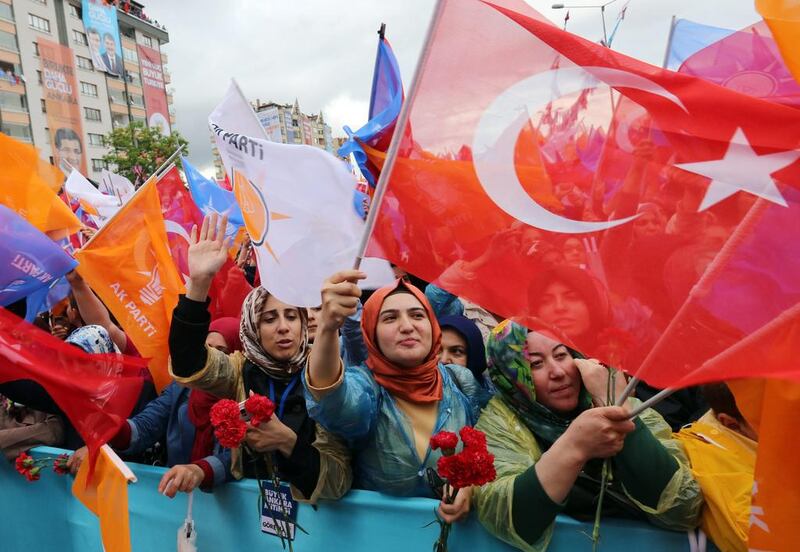Sunday’s general election in Turkey is the most critical in a generation. The vote is about different things: the economy, ideas and identities. Many will vote in faith, many in protest.
Two issues in particular stand out. First, Turkey's president Recep Tayyip Erdogan says the country needs an "executive presidency". He wants the next government to change the constitution so as to transfer power to his office.
Though often portrayed in the international press as a fait accompli, Mr Erdogan’s plans look unlikely to succeed, because the ruling AKP has lost support since 2014. Even if it managed to win the 330 parliamentary seats (out of a total 550) required to take such a constitutional change to referendum, opinion polls indicate the public would not endorse the plan.
Amending the constitution directly requires 367 seats. To get there the AKP will need three things to happen together: receive more votes than the polls are predicting, have another party support the amendment in parliament and have the HDP, the party associated with the Kurdish national movement, to not be able to enter parliament.
Another legitimate question is whether the AKP will win enough seats to form a single party government. Any coalition would be highly unstable. This raises the second great (and much more important) issue of this election: will negotiations continue between the government and Abdullah Ocalan, the jailed leader of the Kurdistan Workers’ Party, to end the years-long conflict? If the AKP forms a minority government, probably not. What’s more, a minority administration would further crack upon itself. The tension in the AKP, exemplified in recent, high-profile spats, would be palpable. Prime minister Ahmet Davutoglu’s job would be in jeopardy. This could scupper the government’s negotiations with Ocalan.
A minority government presumes the HDP enters parliament. Whether it will is the major question of this election.
Turkey’s constitution, drafted by the leaders of the 1980 military takeover, requires a party to win more than 10 per cent of the national vote to enter parliament. Selahattin Demirtas, co-leader of the HDP, won just over 9.75 per cent in last August’s presidential election. Polls indicate support has increased since, but not by much.
If the HDP passes the threshold, it would enter parliament with at least 60 seats, pushing the AKP’s position down to either a slim majority or a minority government.
If it falls short, any races its candidates won would almost certainly be forfeited to the AKP. With such a boost, the AKP could easily form a majority government.
Given such stakes, some foreign observers are worried about election fraud. Many in Turkey believe that vote-stealing has happened in recent elections and that there’s a likelihood it will happen again.
If the HDP fails to pass the 10 per cent threshold, many will believe the vote was rigged. If this happens, the fallout will be widespread.
Not surprising then that some observers see the “best-case” election result to be a slim-majority AKP government, with the HDP in parliament. But even that heralds uncertainty.
Could the AKP and HDP make a deal? Could the HDP make up the seats required to give Mr Erdogan the “executive presidency” he wants in exchange for something like Ocalan’s freedom?
Mr Demirtas has said this would never happen. But there are faintly heard concerns that he is being set up as a fall guy for future accommodation with the AKP.
To pass the 10 per cent threshold the HDP will have brought together core supporters of Mr Ocalan with those who have little positive feelings for the jailed leader.
How will Mr Demirtas balance the elements of his broad, new constituency? And, if the “best-case scenario” does leave Mr Erdogan without the presidential power he wants, what happens next?
Caleb Lauer is a freelance journalist who covers Turkey





